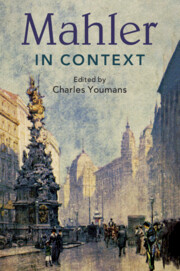Book contents
- Mahler in Context
- Composers in Context
- Mahler in Context
- Copyright page
- Dedication
- Contents
- Figures
- Music Examples
- Notes on Contributors
- Preface and Acknowledgments
- Abbreviations
- Part I Formation
- Part II Performance
- Part III Creation
- Part IV Mind, Body, Spirit
- Chapter 20 Organized Religion
- Chapter 21 German Idealism
- Chapter 22 Nietzsche
- Chapter 23 Fechner
- Chapter 24 Literary Enthusiasms
- Chapter 25 Romantic Relationships
- Chapter 26 Mahler and Death
- Part V Influence
- Further Reading
- Index
Chapter 21 - German Idealism
from Part IV - Mind, Body, Spirit
Published online by Cambridge University Press: 18 December 2020
- Mahler in Context
- Composers in Context
- Mahler in Context
- Copyright page
- Dedication
- Contents
- Figures
- Music Examples
- Notes on Contributors
- Preface and Acknowledgments
- Abbreviations
- Part I Formation
- Part II Performance
- Part III Creation
- Part IV Mind, Body, Spirit
- Chapter 20 Organized Religion
- Chapter 21 German Idealism
- Chapter 22 Nietzsche
- Chapter 23 Fechner
- Chapter 24 Literary Enthusiasms
- Chapter 25 Romantic Relationships
- Chapter 26 Mahler and Death
- Part V Influence
- Further Reading
- Index
Summary
Mahler’s private philosophical interests and ambitions, and, in particular, his determination to use music to address the problem of mortality, are less the result of hubris than a symptom of the thinking at the foundation of his worldview. Mahler came of age as a thinker in the late nineteenth century, a time of great intellectual upheaval and contesting philosophies regarding the world and humanity’s place within it. The epistemological and ontological debates of this era saw idealism and materialism, empiricism and rationalism, as well as many other strands of thinking propagated in the search for a fundamental understanding of life. This chapter considers the place of idealism within contemporaneous intellectual history, defining it and encapsulating the thought of its more important figures, particularly Kant, Fichte, Schelling, and Hegel. The impact of this philosophy on German-speaking culture was profound, as it pervaded the Romantic movement, in which Mahler’s own aesthetics was ultimately rooted.
- Type
- Chapter
- Information
- Mahler in Context , pp. 182 - 188Publisher: Cambridge University PressPrint publication year: 2020

